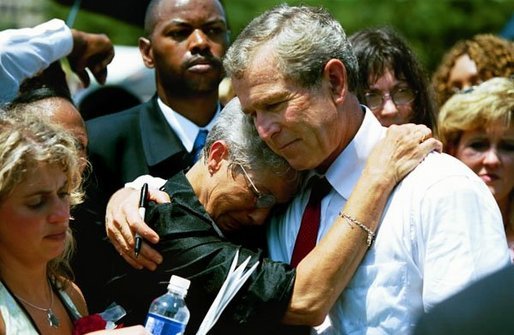Former President George W. Bush called on Americans to abandon partisan divides in the face of the “sheer threat” of the coronavirus pandemic in a video released today.
Bush’s comments come as Democratic governors clash with Republican President Donald Trump over the White House’s coronavirus response, and even drugs that could treat the virus are politicized.
More than a million Americans have tested positive for coronavirus, and well over 60,000 people have died from the virus in the United States. The White House has said it expects total deaths to rise to 74,000 by August.
“Let us remember how small our differences are in the face of this sheer threat,” Bush said. “In the final analysis, we are not partisan combatants. We are human beings, equally vulnerable and equally wonderful in the sight of God. We rise or fall together.”
In the nearly 3-minute video, shared by the George W. Bush Presidential Center, Bush said he saw the nation “embrace unavoidable new duties” after the 9/11 terror attacks, and that “spirit is alive and well in America.” The former president also issued a warning that the impact of the pandemic will not be felt equally.
“Let’s remember that the suffering we experience as a nation does not fall evenly. In the days to come, it will be especially important to care in practical ways for the elderly, the ill and the unemployed,” Bush said. More than 30 million people have filed for unemployment in the last six weeks, as the economy has largely shut down to combat the pandemic.
WATCH: George W. Bush Offers Nation Hope During Pandemic:
Two days after the Sept. 11, 2001 attacks, President Bush spoke to then-New York Mayor Rudolph W. Giuliani and New York Gov. George Pataki by phone in the Oval Office. Bush expressed his sympathy for those who were mourning (“I wish I could comfort every single family whose lives have been affected”) and urged people to treat Arab Americans with respect.
He continued with barely controlled emotion: “I don’t think about myself right now. I think about the families, the children. I am a loving guy, and I am also someone, however, who has got a job to do, and I intend to do it. And this is a terrible moment. But this country will not relent until we have saved ourselves and others from the terrible tragedy that came upon America.”
Channeling the nation’s emotions allowed Bush to direct them in a proper direction — away from domestic bigotry and toward a foreign enemy.
President Trump has led no national mourning for the more than 63,000 Americans who have died from the coronavirus.
In his daily news conferences, he makes only perfunctory references to those who have died as he stiffly reads opening remarks, exhibiting more emotion when grieving his lost economic record than his lost constituents.
Empathy has never been considered one of Trump’s political assets.
He views public displays of sadness as weakness and has made a point of stressing resolve, even at the risk of overlooking the deep pain afflicting so much of the country.
“I can think of many presidents whose finest hours included times of mourning,” said David Greenberg, a presidential scholar at Rutgers University. “In these and other times, the president binds us as a nation by acknowledging and giving voice to our shared sense of loss, grief and pain and pointing the way to better times ahead. Trump hasn’t shown himself capable of this.”
